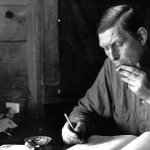I
Beginnings: a chrysalis improvisation
in the wings, roles
taking on flesh before a role begins…
as light begins in the elm,
pushing the long elm branches into night,
a ghost light pressing sky…
or actors, swollen with strange selves,
distended to the edges of tight skin,
a brightness under moth-wing fingertips.
White arms stretch out toward truth.
The stage is full of light.
Your brightness gloves my skin.
II
Alice, grown huge, swollen to fit of the tunnels,
tiny, unable to reach a gold key,
knew what gardens were for—
yet never knelt in tunnels of rough sunlight
to will flamboyance from green buds.
The swollen poppy twists within its cap,
a pink invention wrestling light.
How often I think of tunneling roots,
curtains of roots, white ropes
that stroked our hair when we entered tunnels.
Here, we are rubbed on gold.
This wedge of pink beginnings troubles gardens.
III
A robin listens to darkness.
I think of worms, grubs, moles,
the slow ballet of rootlets twisting down,
of cave fish, blacksnakes,
and, asleep at Nieux, the great black bulls
that thunder on dark walls.
When we wear another self,
do our souls darken? On a bright stage,
do we enter darkest places?
IV
There is darkness clinging to the undersides of leaves.
For we are entering darkness. It skuffs along cave walls,
stumbling and skuffing fingertips.
At Mycenae, it is a heavy must,
a musty heavy breath in the hundred-step cistern.
They wait, dark passageways in old houses, their worn
silence frayed under a blur
of footsteps. Our stretched-out hands
manipulate evasive cellar shadows.
Within the garden, silence darkens windblown leaves.
V
Oh I think of Alice gone down, down
under groundcover dreams,
a man’s tunneled night.
Who are these actors? On dream stages, I forget
lines. My tongue-tied
silence foundering… Stage props
mumble rigidities. The audience…
I think of silences at Nieux,
at Mycenae, the tourists
gone, guides returned
to wives, houses….
And those silences of capricious light.
The calex splits, an abrupt pink flame.
Orpheus’ torch descends and still descends through
arias of reddest blossom.



















Comment form: